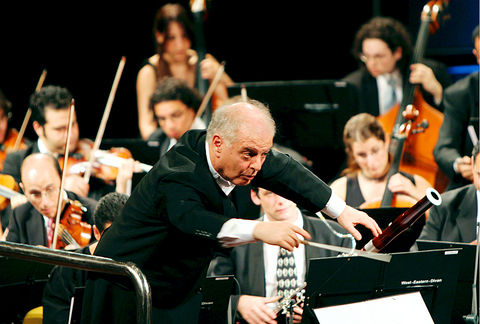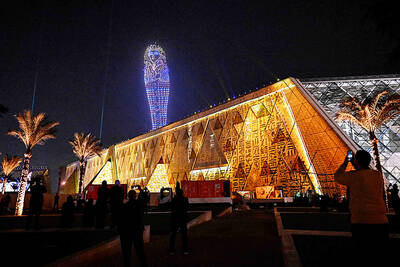The sound of Beethoven's Fifth Symphony drowned out the staccato of bullets on Sunday in the conflict-ridden Middle East as world-famous conductor Daniel Barenboim dazzled his Ramallah audience with both music and words.
Playing under the theme "Freedom for Palestine," Barenboim and his new West-Eastern Diwan orchestra were able to break all barriers and help an audience fatigued by strife to enjoy two hours of pure music from Beethoven and Mozart.
The interest in the concert was obvious for an hour before it started and for 15 minutes after the final note.

PHOTO: EPA
The 1,200-seat auditorium of the Ramallah Cultural Center was packed with a Palestinian, international and even Israeli audience an hour before the baton was scheduled to drop. As the seats filled, hundreds others milled in the hallways and the aisles hoping to get a seat or just to be allowed to stay in standing room and listen to Barenboim and the orchestra.
The same audience stood for 15 minutes, enthusiastically clapping and yelling "bravo" after Barenboim concluded the performance, giving Palestinians in Ramallah a chance to forget the checkpoints, the occupation, the wall and everything that has made their lives void of spirit, as one member of the audience remarked after the concert.
Outside the auditorium, the reality for West Bank residents had not yet changed after the concert, as Barenboim hoping to achieve with his music and orchestra.
A few audience members had to leave early to get home before some checkpoints at entrances to Ramallah closed. Others who waited until the end and headed home after the concert had to stop in long lines of cars waiting at checkpoints to be able to reach their homes. Barenboim realized this reality, and this is why he brought his new orchestra to Ramallah.
"What I want to say to you," Barenboim told the audience after the orchestra finished playing, "I have already said in the music.
"This is an orchestra for peace. This orchestra is not going to bring peace. What it can bring is understanding, patience and courage to listen to the narrative of the other, to hear the version of the other," he said.
"We came with a message of humanity; a message of solidarity for freedom that Palestine needs and the whole region needs. There is no military solution to this conflict. The destiny of these two people [Palestinians and Israelis] is inextricably linked," he said.
"It is the duty of everyone to find a way to live together. We either kill each other or learn to live together. It is this message we come with today," he said.
Barenboim said it took his orchestra members courage to come together and play in Israeli-occupied Ramallah. It was the dream of his close friend, the late Palestinian academic and author, Edward Said, to put the West-Eastern Diwan orchestra together and play for peace between Arabs and Jews.
Said's premature death left the task to Barenboim, who was able to bring musicians from different Arab countries, including Syria and Lebanon, which are at war with Israel, and Israeli musicians to play in occupied Ramallah.
While most of the orchestra members were European, the presence of a few Arab and Israeli musicians playing side by side in Ramallah made Barenboim and Said's dream come true.
The concert in Ramallah was the orchestra's first, and it plans to play in other Arab capitals in the future.

‘CHILD PORNOGRAPHY’: The doll on Shein’s Web site measure about 80cm in height, and it was holding a teddy bear in a photo published by a daily newspaper France’s anti-fraud unit on Saturday said it had reported Asian e-commerce giant Shein (希音) for selling what it described as “sex dolls with a childlike appearance.” The French Directorate General for Competition, Consumer Affairs and Fraud Control (DGCCRF) said in a statement that the “description and categorization” of the items on Shein’s Web site “make it difficult to doubt the child pornography nature of the content.” Shortly after the statement, Shein announced that the dolls in question had been withdrawn from its platform and that it had launched an internal inquiry. On its Web site, Le Parisien daily published a

China’s Shenzhou-20 crewed spacecraft has delayed its return mission to Earth after the vessel was possibly hit by tiny bits of space debris, the country’s human spaceflight agency said yesterday, an unusual situation that could disrupt the operation of the country’s space station Tiangong. An impact analysis and risk assessment are underway, the China Manned Space Agency (CMSA) said in a statement, without providing a new schedule for the return mission, which was originally set to land in northern China yesterday. The delay highlights the danger to space travel posed by increasing amounts of debris, such as discarded launch vehicles or vessel

RUBBER STAMP? The latest legislative session was the most productive in the number of bills passed, but critics attributed it to a lack of dissenting voices On their last day at work, Hong Kong’s lawmakers — the first batch chosen under Beijing’s mantra of “patriots administering Hong Kong” — posed for group pictures, celebrating a job well done after four years of opposition-free politics. However, despite their smiles, about one-third of the Legislative Council will not seek another term in next month’s election, with the self-described non-establishment figure Tik Chi-yuen (狄志遠) being among those bowing out. “It used to be that [the legislature] had the benefit of free expression... Now it is more uniform. There are multiple voices, but they are not diverse enough,” Tik said, comparing it

Prime ministers, presidents and royalty on Saturday descended on Cairo to attend the spectacle-laden inauguration of a sprawling new museum built near the pyramids to house one of the world’s richest collections of antiquities. The inauguration of the Grand Egyptian Museum, or GEM, marks the end of a two-decade construction effort hampered by the Arab Spring uprisings, the COVID-19 pandemic and wars in neighboring countries. “We’ve all dreamed of this project and whether it would really come true,” Egyptian Prime Minister Mostafa Madbouly told a news conference, calling the museum a “gift from Egypt to the whole world from a